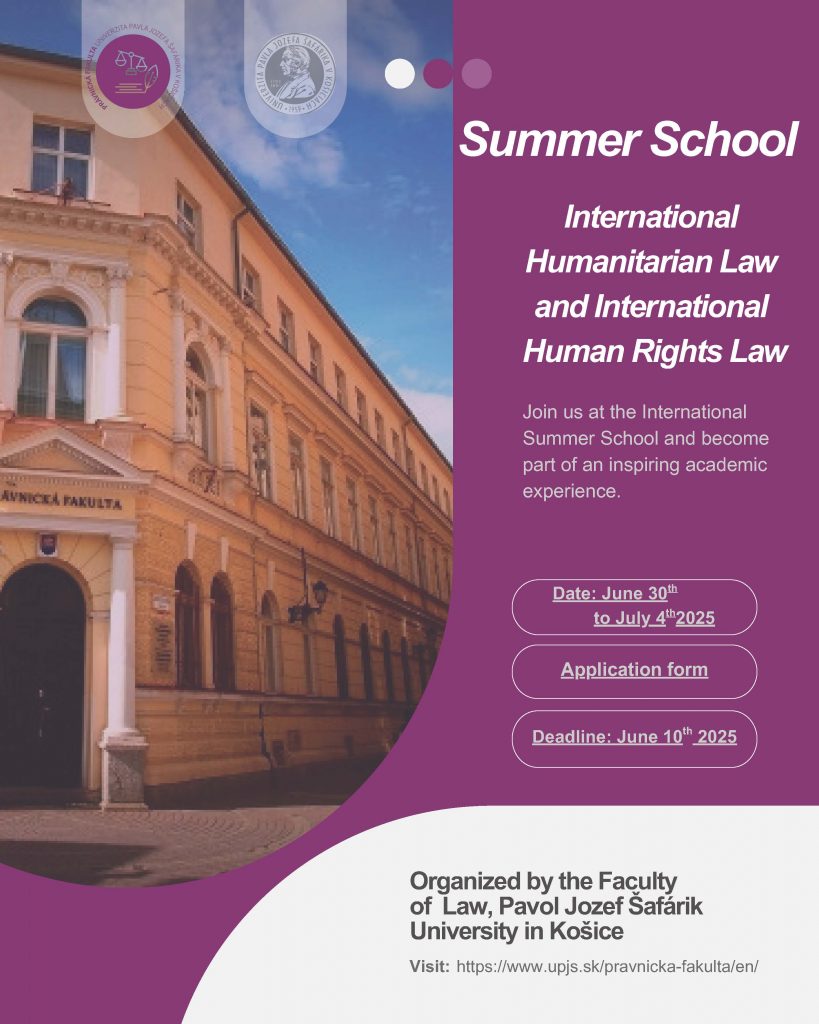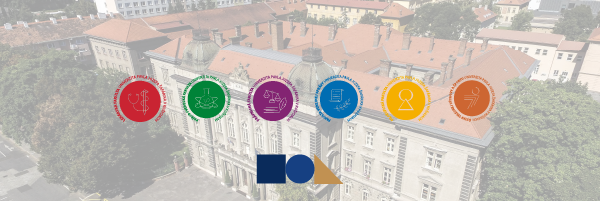Join us at the Pavol Jozef Šafárik University in Košice during 2025 Summer School of International Humanitarian Law and Human Rights Law for learning experience dedicated to current issues of the Law of Armed Conflicts, International Humanitarian Law, Human Rights Law and Refugee Law. Summer School is an opportunity to strengthen promotion of the humanitarian law, Geneva Conventions and general rules of war, as well as human rights of affected population.
Introductory notes
Current international humanitarian law and international human rights regulation (including refugee and asylum law) face several challenges that limit the scope and effectiveness of their application.
In the case of international humanitarian law, the primary issue is the increasing use of armed force, often accompanied by grave and systematic violations of humanitarian norms, especially in relation to civilian populations and prisoners of war. Experience from post-conflict situations confirms that it is precisely these groups of war victims who frequently become targets of wartime violence, often with fatal consequences. This reality is significantly exacerbated by modern weapons systems with extensive destructive capacities, which are deployed not only against armed forces but also against civilians, including in the context of „electronic warfare“. In this regard, one may also speak of a general dehumanization of armed conflicts, in which victims are increasingly subjected to indiscriminate and disproportionate suffering. These developments undermine the practical applicability of international humanitarian law, particularly due to the growing use of lethal force against victims of armed conflict.
Armed conflicts also generate refugees, asylum seekers and displaced persons who flee unstable and dangerous conditions in their countries of origin. This group increasingly includes economic migrants, and more recently, environmentally displaced persons, who flee either in search of a better life or in response to threats arising from climate change and environmental degradation. The growing waves of such persons pose a challenge to international asylum and refugee law, which has not been—and still is not—sufficiently equipped to address the mass character of such movements or to resolve individual legal statuses within a reasonable timeframe and in an appropriate manner. Since Europe is the ultimate destination for many of these individuals, their arrival is addressed through the application of EU law and various practical measures, primarily aimed at limiting the entry of migrants into the European Union. Recent developments indicate the EU’s efforts to tighten, accelerate, and streamline migration procedures, as well as to enhance the efficiency and speed of mechanisms for returning applicants who do not meet the necessary legal criteria to their home countries. As only a limited number of EU Member States bear the burden of migration pressures, the issue of a more equitable distribution of migrants to other Member States—or even to non-Member States—remains unresolved.
The Summer School on International Humanitarian Law and International Human Rights Law offers participants an opportunity to assess the contribution of international humanitarian law and international human rights law in the current global context and to identify key issues for their future development.
prof. JUDr. Ján Klučka, CSc.
former judge of CJEU
Institute of International law and European Law, Faculty of Law, Košice
International human rights law faces a number of its own specific challenges, including the non-compliance with international human rights norms due to a lack of political will among states to implement them; ignorance or misinterpretation of international human rights law within domestic systems; insufficient enforcement mechanisms for existing international human rights standards at the universal level; the need to improve the international legal regulation of the protection of economic, social, and cultural rights, as well as environmental human rights, both at the universal and regional levels; the necessity to regulate the impact of artificial intelligence on the application of human rights; and the need to address human rights violations committed by non-state actors such as transnational corporations, terrorist groups, or private military companies.
The Summer School on International Humanitarian Law and International Human Rights Law offers participants to gain insights into how to address some of these challenges of international human rights law.
prof. JUDr. Juraj Jankuv, PhD.
Professor of Public International Law
Institute of International law and European Law, Faculty of Law, Košice











